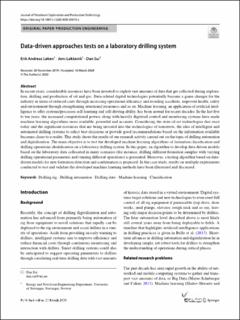| dc.contributor.author | Løken, Erik Andreas | |
| dc.contributor.author | Løkkevik, Jens | |
| dc.contributor.author | Sui, Dan | |
| dc.date.accessioned | 2023-02-09T13:47:56Z | |
| dc.date.available | 2023-02-09T13:47:56Z | |
| dc.date.created | 2020-08-19T14:01:11Z | |
| dc.date.issued | 2020 | |
| dc.identifier.citation | Løken, E. A., Løkkevik, J., & Sui, D. (2020). Data-driven approaches tests on a laboratory drilling system. Journal of Petroleum Exploration and Production Technology, 10, 3043-3055. | en_US |
| dc.identifier.issn | 2190-0558 | |
| dc.identifier.uri | https://hdl.handle.net/11250/3049790 | |
| dc.description.abstract | In recent years, considerable resources have been invested to exploit vast amounts of data that get collected during exploration, drilling and production of oil and gas. Data-related digital technologies potentially become a game changer for the industry in terms of reduced costs through increasing operational efficiency and avoiding accidents, improved health, safety and environment through strengthening situational awareness and so on. Machine learning, an application of artificial intelligence to offer systems/processes self-learning and self-driving ability, has been around for recent decades. In the last five to ten years, the increased computational powers along with heavily digitized control and monitoring systems have made machine learning algorithms more available, powerful and accurate. Considering the state-of-art technologies that exist today and the significant resources that are being invested into the technologies of tomorrow, the idea of intelligent and automated drilling systems to select best decisions or provide good recommendations based on the information available becomes closer to a reality. This study shows the results of our research activity carried out on the topic of drilling automation and digitalization. The main objective is to test the developed machine learning algorithms of formation classification and drilling operations identification on a laboratory drilling system. In this paper, an algorithm to develop data-driven models based on the laboratory data collocated in many scenarios (for instance, drilling different formation samples with varying drilling operational parameters and running different operations) is presented. Moreover, a testing algorithm based on data-driven models for new formation detection and confirmation is proposed. In the case study, results on multiple experiments conducted to test and validate the developed machine learning methods have been illustrated and discussed. | en_US |
| dc.language.iso | eng | en_US |
| dc.publisher | Springer | en_US |
| dc.rights | Navngivelse 4.0 Internasjonal | * |
| dc.rights.uri | http://creativecommons.org/licenses/by/4.0/deed.no | * |
| dc.title | Data-Driven Approaches Tests on A Laboratory Drilling System | en_US |
| dc.type | Peer reviewed | en_US |
| dc.type | Journal article | en_US |
| dc.description.version | publishedVersion | en_US |
| dc.rights.holder | The authors | en_US |
| dc.subject.nsi | VDP::Teknologi: 500 | en_US |
| dc.source.journal | Journal of Petroleum Exploration and Production Technology | en_US |
| dc.identifier.doi | 10.1007/s13202-020-00870-z | |
| dc.identifier.cristin | 1824077 | |
| cristin.ispublished | true | |
| cristin.fulltext | original | |
| cristin.qualitycode | 1 | |

